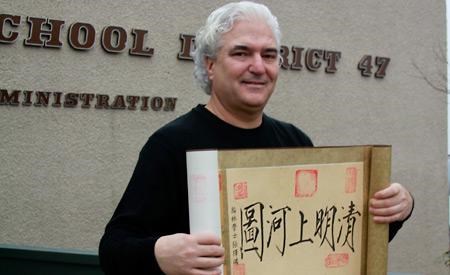Superintendent of schools for School District 47 recently travelled to the People’s Republic of China to inspect BC offshore schools and worked on creating ties in the promotion of international programs.
“It was a good opportunity to go because there was sponsorship for the travel expenses,” said Jay Yule. “It was really great to see so many young enthusiastic BC teachers.”
BC currently has 34 offshore schools, all part of the ministry of education’s BC Global Education Program. Most are in China where there is an increasing demand for students to learn English with teachers from English-speaking countries. Yule had the opportunity to spend a week in November inspecting schools in Beijing and Kaifeng. He visited three schools, all part of the Sino Bright company.
“The BC offshore schools are often a school within a school,” said Yule. “There may be two or three thousand students in the school and two or three hundred taking classes in the BC offshore program.”
The offshore schools are housed within regular Chinese schools and provide Chinese students with a British Columbia kindergarten to grade 12 education. BC certified teachers teach ESL [English as a second language] immersion classes with BC curriculum. When students complete the program, they are granted a Dogwood diploma, which makes attending Canadian universities easier.
Inspectors from the ministry look at a variety of practices at the schools to see if there are course outlines for classes and how material is being delivered and assessed by teachers. The inspections are annual as teachers and administrators can change from year to year due to the unique challenges of living abroad.
“A lot of the processes in place are not any different than the review or accreditation of BC schools,” said Yule.
Inspections are planned and school administrators know when they are going to happen.
“It’s no surprise,” said Yule. “Everyone knows that the team or inspector is coming. It’s the same thing when the ministry comes to audit our processes. It’s not going in with an investigative role with the assumption that something is wrong. The assumption is that we’re going in to ensure that there’s a level of accountability to the ministry and that processes schools say they have in place are indeed in place. I don’t think it’s any different for schools offshore than school districts in British Columbia.”
This was Yule’s second trip to China. He travelled there in 2011 with a group of Canadian district superintendents to tour Chinese schools. This time he saw Chinese students studying in what looked and sounded like any classroom in the province.
In spring of 2002, Gordon Campbell’s Liberal government amended the BC School Act with Bill 34 which allows for the creation of for-profit school board business companies. With this legislation, school districts were encouraged to pursue profit-making endeavours, like sponsoring offshore schools. Some school districts in the Lower Mainland have pursued offshore schools as a way to bring more money into the district.
School District 47 is interested in bringing more international students to Powell River schools as well as increasing opportunities for local students and teachers to travel abroad, but setting up an offshore school, or sponsoring one, may not be in the cards. High startup costs and already shrinking budgets mean that other opportunities are being looked at.
“We’re not in any rush to set anything up,” said Yule. “It takes huge amounts of money to get an offshore school running, and we’re not willing to spend the money. We would rather work to develop some relationships and connections before we go ahead with anything. We don’t have an interest in simply sponsoring an offshore school to try to make revenue. It doesn’t fulfill the educational need we have.”
Yule said he’d like to find a way for students to gain a broader world view, learn more about diversity and have the opportunity to travel at a reasonable cost.
He would prefer seeking out a high level partnership that could bring Chinese students to Powell River for a semester or a year and the same kind of opportunity for Powell River students travelling to China.
Yule said he thinks the sister cities partnership the City of Powell River is considering signing with Putian, a city in the coastal province of Fujian in China, might hold greater opportunities. It would provide a wider range of educational and cultural exchanges, he said.
“It involves our whole community from K to post-secondary to cultural tourism and that just makes more sense,” said Yule. “It’s not just a K to 12 opportunity. There are many opportunities for cultural exchanges and that’s appealing for us. It would make more sense if we’re all in it together. There would be more efficiencies and we’re not all travelling on our own.”
Currently, the district’s international educational program helps create diversity within Brooks Secondary School. There are about 33 to 35 international students attending Brooks every year and Yule believes the school could fit 50 international students. “It would be a good number to create a good diverse mix of students.”
Besides inspecting schools, Yule was able to spend some time in Beijing being toured around by western teachers who live and work there. He said during his first trip he took a lot of notes on etiquette and culture, so he felt a little more comfortable this time knowing more about what to expect.
“Chinese culture is very subtle,” he said. “There are western business people who go there and have the dinner, sign the contracts and think they get it, but they don’t.”



